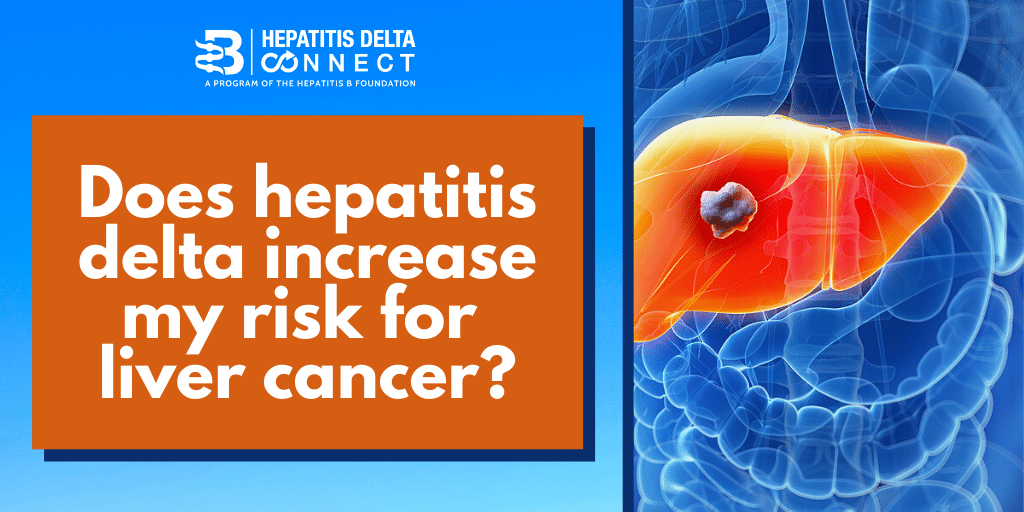
The short answer is, possibly. Although there is extensive research to support the role of hepatitis delta in accelerating the risk for progression to cirrhosis (liver scarring) compared to hepatitis B infection (1,2) only, strong data directly linking an increase in risk for hepatocellular carcinoma (HCC) is lacking. It is known that coinfection promotes continually progressing inflammation within the liver by inducing a strong immune response within the body; where it essentially attacks itself (3), but the specific role of hepatitis delta in HCC isn’t fully understood. It gets complicated because although cirrhosis is usually present in hepatitis B patients who also have HCC, but scientists have not pinpointed a specific way that the virus may impact cancer development (4). There have been some small studies that have documented a correlation between hepatitis delta and an increase in HCC, but some analysis’s have even called the extent of its involvement in HCC as ‘controversial’ (5). However, other scientific studies may suggest the contrary.
Because hepatitis delta cannot survive without hepatitis B, and doesn’t integrate into the body the same way, it may not be directly responsible for cancer development, but it has been suggested that the interactions between the two viruses may play a role (6). It has also been suggested that hepatitis delta may play a role in genetic changes, DNA damage, immune response and the activation of certain proteins within the body – similarly to hepatitis B and may amplify the overall cancer risk (7,8). One of these theories even suggests that hepatitis delta inactivates a gene responsible for tumor suppression, meaning it may actually promotes tumor development, a process that has been well-documented in HCC cases (9,10).
Regardless of the specific impact or increase in risk for HCC due to the hepatitis delta virus, hepatitis B is known to increase someone’s risk, with 50-60% of all HCC globally attributable to hepatitis B (11). People with hepatitis delta coinfection still need to be closely monitored by a liver specialist, as 70% of people with both viruses will develop cirrhosis within 5-10 years (12). Monitoring may be blood testing and a liver ultrasound to screen for HCC every 6 months. Closer monitoring may be required if cirrhosis is already present, or to monitor response to treatment (interferon).
For more information about hepatitis delta, visit www.hepdconnect.org.
References:
- Manesis EK, Vourli G, Dalekos G. Prevalence and clinical course of hepatitis delta infection in Greece: A 13-year prospective study. J Hepatol. 2013;59:949–956.
- Coghill S, McNamara J, Woods M, Hajkowicz K. Epidemiology and clinical outcomes of hepatitis delta (D) virus infection in Queensland, Australia. Int J Infect Dis. 2018;74:123–127.
- Zhang Z, Filzmayer C, Ni Y. Hepatitis D virus replication is sensed by MDA5 and induces IFN-β/λ responses in hepatocytes. J Hepatol. 2018;69:25–35.
- Nault JC. Pathogenesis of hepatocellular carcinoma according to aetiology. Best Pract Res Clin Gastroenterol. 2014;28:937–947.
- Puigvehí, M., Moctezuma-Velázquez, C., Villanueva, A., & Llovet, J. M. (2019). The oncogenic role of hepatitis delta virus in hepatocellular carcinoma. JHEP reports: innovation in hepatology, 1(2), 120–130.
- Romeo R, Petruzziello A, Pecheur EI, et al. Hepatitis delta virus and hepatocellular carcinoma: an update. Epidemiol Infect. 2018;146(13):1612‐1618.
- Majumdar A, Curley SA, Wu X. Hepatic stem cells and transforming growth factor β in hepatocellular carcinoma. Nat Rev Gastroenterol Hepatol. 2012;9:530–538.
- Mendes M, Pérez-Hernandez D, Vázquez J, Coelho AV, Cunha C. Proteomic changes in HEK-293 cells induced by hepatitis delta virus replication. J Proteomics. 2013;89:24–38.
- Chen M, Du D, Zheng W. Small Hepatitis Delta Antigen Selectively Binds to Target mRNA in Hepatic Cells: A Potential Mechanism by Which Hepatitis D Virus Down-Regulates Glutathione S-Transferase P1 and Induces Liver Injury and Hepatocarcinogenesis. Biochem Cell Biol. August 2018.
- Villanueva A, Portela A, Sayols S. DNA methylation-based prognosis and epidrivers in hepatocellular carcinoma. 2015;61:1945–1956.
- Hayashi PH, Di Bisceglie AM. The progression of hepatitis B- and C-infections to chronic liver disease and hepatocellular carcinoma: epidemiology and pathogenesis. Med Clin North Am. 2005;89(2):371‐389.
- Abbas, Z., Abbas, M., Abbas, S., & Shazi, L. (2015). Hepatitis D and hepatocellular carcinoma. World journal of hepatology, 7(5), 777–786.

